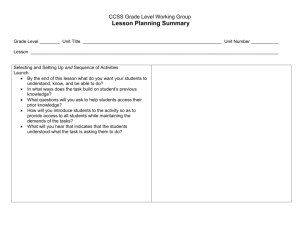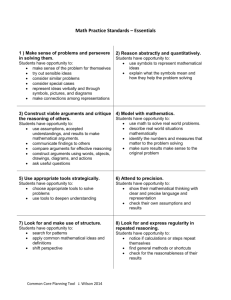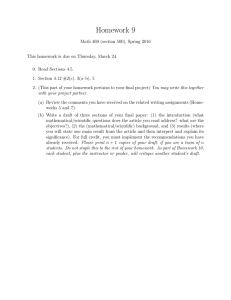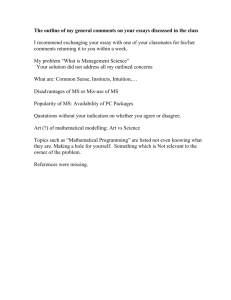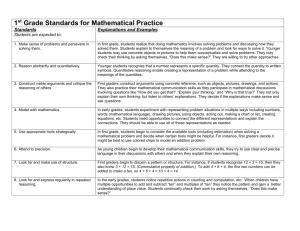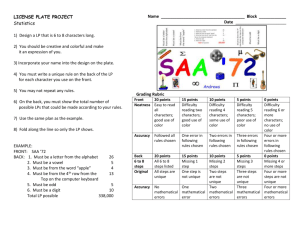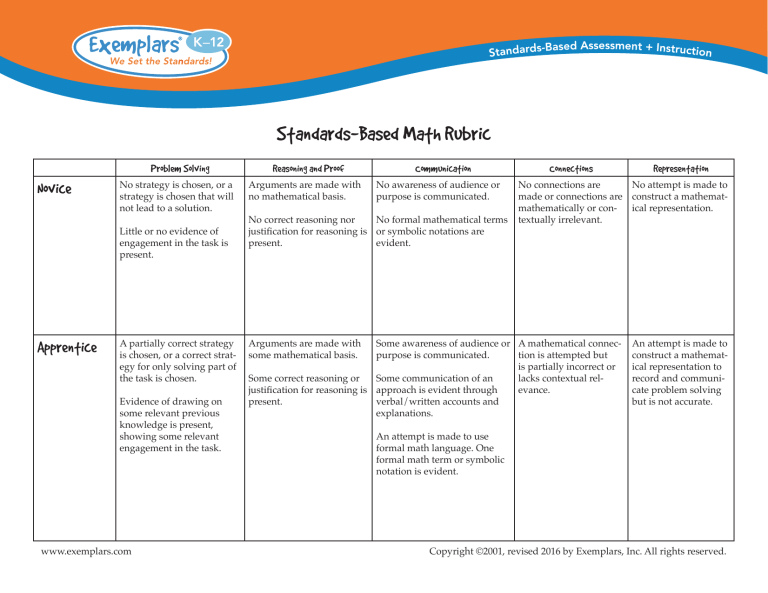
Standards-Based Math Rubric
Problem Solving
Novice
No strategy is chosen, or a
strategy is chosen that will
not lead to a solution.
Little or no evidence of
engagement in the task is
present.
Apprentice
A partially correct strategy
is chosen, or a correct strategy for only solving part of
the task is chosen.
Evidence of drawing on
some relevant previous
knowledge is present,
showing some relevant
engagement in the task.
www.exemplars.com
Reasoning and Proof
Arguments are made with
no mathematical basis.
Communication
No awareness of audience or
purpose is communicated.
No correct reasoning nor
No formal mathematical terms
justification for reasoning is or symbolic notations are
present.
evident.
Arguments are made with
some mathematical basis.
Connections
Representation
No connections are
No attempt is made to
made or connections are construct a mathematmathematically or conical representation.
textually irrelevant.
Some awareness of audience or A mathematical connecpurpose is communicated.
tion is attempted but
is partially incorrect or
Some correct reasoning or
Some communication of an
lacks contextual reljustification for reasoning is approach is evident through
evance.
present.
verbal/written accounts and
explanations.
An attempt is made to
construct a mathematical representation to
record and communicate problem solving
but is not accurate.
An attempt is made to use
formal math language. One
formal math term or symbolic
notation is evident.
Copyright ©2001, revised 2016 by Exemplars, Inc. All rights reserved.
Standards-Based Math Rubric (Cont.)
Problem Solving
Practitioner
A correct strategy is chosen based on the mathematical situation in the
task.
Planning or monitoring of
strategy is evident.
Evidence of solidifying
prior knowledge and
applying it to the
problem-solving situation
is present.
Reasoning and Proof
Arguments are constructed with adequate mathematical basis.
A systematic approach
and/or justification of
correct reasoning is present.
Note: The Practitioner must
achieve a correct answer.
Expert
An efficient strategy is
chosen and progress
towards a solution is
evaluated.
Deductive arguments are
used to justify decisions
and may result in formal
proofs.
Communication
A sense of audience or purpose is communicated.
Communication of an approach is evident through a
methodical, organized, coherent, sequenced and labeled
response.
Note: The Expert must achieve a
correct answer.
www.exemplars.com
Representation
A mathematical connection
is made. Proper contexts are
identified that link both the
mathematics and the situation
in the task.
An appropriate and
accurate mathematical representation(s) is
constructed and refined
to solve problems or
portray solutions.
Some examples may include
one or more of the following:
• clarification of the mathematical or situational context
Formal math language is used
of the task
to share and clarify ideas. At
•
exploration
of mathematical
least two formal math terms or
phenomenon
in the context
symbolic notations are eviof
the
broader
topic in which
dent, in any combination.
the task is situated
• noting patterns, structures
and regularities
A sense of audience and purpose is communicated.
Communication at the Practitioner level is achieved, and
Adjustments in strategy, if Evidence is used to justify communication of argument
necessary, are made along and support decisions
is supported by mathematical
the way, and/or alternamade and conclusions
properties.
tive strategies are consid- reached.
ered.
Formal math language and
Evidence of analyzing the
situation in mathematical
terms and extending prior
knowledge is present.
Connections
symbolic notation is used to
consolidate math thinking
and to communicate ideas. At
least one of the math terms or
symbolic notations is beyond
grade level.
Mathematical connections are
used to extend the solution
to other mathematics or to a
deeper understanding of the
mathematics in the task.
Some examples may include
one or more of the following:
• testing and accepting or
rejecting of a hypothesis or
conjecture
• explanation of phenomenon
• generalizing and extending
the solution to other cases
An appropriate mathematical
representation(s) is
constructed to analyze
relationships, extend
thinking and clarify or
interpret phenomenon.
Copyright ©2001, revised 2016 by Exemplars, Inc. All rights reserved.

